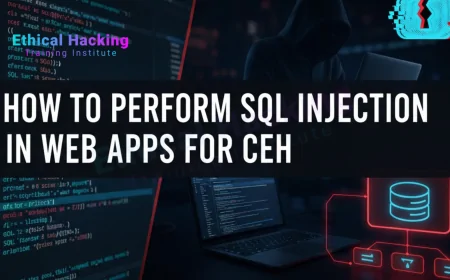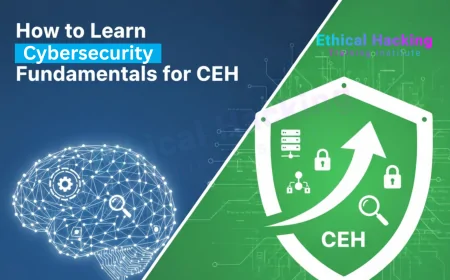EC Council CEH: A Comprehensive Guide to Your Ethical Hacking Career | How EC-Council’s CEH Certification Can Jumpstart Your Ethical Hacking Career
Explore the EC Council CEH certification in-depth — understand its modules, benefits, tools, and career opportunities. Begin your ethical hacking journey with expert guidance.

Table of Contents
- Introduction
- What Is EC Council CEH?
- Why Choose the CEH Certification?
- CEH Course Structure & Modules
- Key Skills You’ll Learn
- Tools & Hands‑On Labs
- Training Formats & Delivery
- Exam Overview & Preparation
- Career Paths After CEH
- Salary & Market Demand
- Costs, Packages & ROI
- Advanced Certifications & Next Steps
- Success Tips for CEH Preparation
- FAQs
- Conclusion
Introduction
With global recognition, CEH certification showcases your skills in thinking like a hacker while adhering to legal and ethical standards. Whether you're an IT professional seeking advancement or a newcomer aiming for a cybersecurity career, CEH provides practical skills in vulnerability assessment, penetration testing, and cyber defense strategies.
What Is EC Council CEH?
The EC-Council CEH (Certified Ethical Hacker) is a globally recognized cybersecurity certification that validates your ability to identify, assess, and ethically exploit vulnerabilities in computer systems, networks, and applications—using the same tools and techniques as malicious hackers, but in a lawful and authorized manner.
Breakdown of EC-Council CEH:
| Feature | Description |
|---|---|
| Issued by | EC-Council (International Council of E-Commerce Consultants) |
| Full Form | Certified Ethical Hacker |
| Level | Intermediate (Tier 1–2 cybersecurity professional certification) |
| Accreditation | ANSI 17024, recognized by DoD 8140/8570 and major enterprises globally |
| Exam Code | 312-50 (CEH ANSI version) |
| Duration | 4 hours, 125 multiple-choice questions |
| Maintains validity | 3 years; 120 ECE credits are needed to renew. |
Primary Goal of CEH
To equip professionals with the skills to think like a hacker so they can:
-
Proactively find weaknesses in systems and fix them before attackers do.
-
Understand the hacker’s mindset, methodology, and tools.
-
Ethically protect organizations from real-world cyber threats.
What You’ll Learn in CEH
-
Footprinting & Reconnaissance
-
Network Scanning & Enumeration
-
System Hacking & Privilege Escalation
-
Trojan, Worms, Viruses, and Rootkits
-
Sniffing, Session Hijacking
-
Denial-of-Service Attacks
-
Web Server & Web App Hacking (XSS, SQLi, CSRF, etc.)
-
Wireless and Mobile Security
-
Cloud Security & IoT Exploits
-
Cryptography, Malware Analysis
-
Social Engineering & Physical Security Testing
-
Penetration Testing Methodology & Reporting
Tools Covered
You’ll train with 300+ tools such as:
-
Nmap, Wireshark, Metasploit
-
Burp Suite, John the Ripper, Nikto
-
Aircrack-ng, Netcat, Hydra
-
OpenVAS, Sqlmap, Nessus
-
Maltego, Recon-ng, and many others
Who Should Take CEH?
-
Aspiring Ethical Hackers / Penetration Testers
-
Network Security Engineers
-
Information Security Analysts
-
Security Auditors / Consultants
-
IT Admins looking to transition to cybersecurity
Global Recognition & Job Prospects
-
CEH is used by the U.S. Department of Defense, Fortune 500 companies, and top consulting firms as a baseline cybersecurity skillset.
-
CEH certification holders are eligible for roles like:
-
Ethical Hacker
-
Security Operations Center (SOC) Analyst
-
Penetration Tester
-
Information Security Officer
-
CEH is not about teaching you how to hack—it’s about teaching you how hackers think, and how to stop them.
Why Choose the CEH Certification?
- Global Recognition: ANSI-accredited, recognized by governments and Fortune 500 companies.
- Ethical Hacking Mindset: Instills the mindset of a hacker to help you predict and prevent security breaches—ethically and professionally.
- Versatility: Applicable across industries—finance, defense, healthcare, tech.
- Career Boost: Opens roles like Ethical Hacker, Pentester, Security Analyst, Security Consultant.
- Foundation for Higher Certs: Builds toward CEH Practical, OSCP, CISSP, CISM.
CEH Course Structure & Modules
The CEH curriculum covers 20 comprehensive modules:
- Introduction to Ethical Hacking
- Footprinting & Reconnaissance
- Scanning Networks
- Enumeration
- System Hacking
- Malware Threats
- Sniffing
- Social Engineering
- Denial-of-Service Attacks
- Session Hijacking
- Evading IDS, Firewalls, Honeypots
- Hacking Web Servers & Applications
- SQL Injection
- Hacking Wireless Networks
- Hacking Mobile Platforms
- IoT & OT Hacking
- Cloud Computing Security
- Cryptography
- Penetration Testing Methodologies
- Ethics & Legal Issues
Key Skills You’ll Learn
- Technical reconnaissance and network mapping
- Vulnerability scanning and exploitation methods
- Web app testing: XSS, SQLi, CSRF, SSRF
- Malware analysis, threat emulation techniques
- Wireless and mobile platforms security
- Incident response, report writing, compliance standards
Tools & Hands‑On Labs
CEH provides immersive labs using EC‑Council iLabs or equivalent platforms:
- Nmap: Network mapping and discovery
- Metasploit: Attack framework
- Burp Suite: Web application vulnerability testing
- Wireshark: Packet analysis
- Aircrack-ng: Wireless network penetration
- John the Ripper: Password cracking
Labs simulate real-world environments, red team vs. blue team scenarios, CTF challenges, and reporting practice.
Training Formats & Delivery
- Self‑Paced Online: Access lectures and labs 24/7
- Live Instructor‑Led Online: Interactive sessions with certified instructors
- Classroom / Bootcamp: Day-long schedules for rapid certification
- Hybrid Model: Combines live sessions with self-study flexibility
Exam Overview & Preparation
- Format: 125 multiple-choice questions in 4 hours
- Passing Score: Typically between 60–85%
- Exam Code: 312-50 (ANSI)
- Preparation: Practice quizzes, mock exams, blueprint-aligned questions
Career Paths After CEH
CEH certification unlocks roles such as:
- Ethical Hacker / Penetration Tester
- Security Analyst / Security Engineer
- Information Security Consultant
- Incident Response Specialist
- Vulnerability Assessment Specialist
Salary & Market Demand
In India, entry-level CEH professionals earn between ₹6–12 LPA, with mid-level roles reaching ₹15–25 LPA. Globally, experienced CEH-certified individuals can earn $80K–$120K+ annually. Demand is growing due to remote work, IoT growth, and regulatory focus.
Costs, Packages & ROI
Typical pricing structures:
- Self‑paced: ₹25,000–₹35,000
- Instructor‑led: ₹35,000–₹55,000 (includes labs & exam voucher)
- Bootcamp: ₹55,000–₹75,000 (exam voucher + retake + mentorship)
ROI: Payback often within 6–12 months via job upgrades, freelance projects, or consultancy fees.
Advanced Certifications & Next Steps
- CEH Practical: Performance-based certification
- ECSA: Structured penetration testing framework
- LPT Master: Elite-level assessment
- OSCP / OSCE: Offensive Security certifications
- CISSP / CISM: Leadership and governance
Success Tips for CEH Preparation
- Set a consistent study schedule and fully explore lab exercises
- Use mock tests to identify knowledge gaps
- Engage in online communities and forums
- Apply learning in real scenarios: freelance, bug bounties, personal labs
- Document practice in reports to build communication skills
FAQs
1. Is CEH suitable for beginners?
Yes—EC Council offers training waivers for candidates without experience, making it accessible to those with foundational IT knowledge.
2. How long does CEH certification last?
Valid for 3 years; recertification requires earning 120 continuing education credits or retaking the exam.
3. What is the cost of CEH training?
Ranges from ₹25,000 to ₹75,000 in India, depending on format and inclusions.
4. How hard is the CEH exam?
Moderately challenging; requires understanding of theory and lab practice. Preparation with mock tests is highly recommended.
5. Does CEH include labs?
Yes—most packages include EC Council iLabs or equivalent virtual labs for hands-on learning.
6. How many questions in CEH?
125 multiple-choice questions with a 4-hour time limit.
7. Can I take the CEH exam remotely?
Yes—it’s available through proctored online testing or Pearson VUE centers.
8. What jobs can CEH get me?
Roles include Ethical Hacker, Security Analyst, Penetration Tester, Incident Responder, and Consultant.
9. Does CEH require coding skills?
Basic scripting (Python, Bash) is beneficial but not mandatory.
10. What certification comes after CEH?
CEH Practical, ECSA, OSCP, CISSP, depending on your chosen pathway.
11. Is CEH worth the investment?
Yes—ROI is strong thanks to higher salary prospects and in-demand job roles.
12. Can CEH help in bug bounty programs?
Absolutely—CEH teaches reconnaissance, vulnerability assessment, and reporting—core bug bounty skills.
13. Does CEH cover cloud security?
Yes—the curriculum includes modules on cloud computing vulnerabilities and security best practices.
14. How to renew CEH?
Earn EC Council credits via training/events or retake the exam every 3 years.
15. What is CEH Practical?
A hands-on exam requiring real-time exploit of vulnerabilities in a controlled environment.
16. Are there prerequisites for CEH?
None mandatory—training waivers are available, but basic IT knowledge helps.
17. Is CEH globally recognized?
Yes—it’s ANSI-accredited and trusted internationally by enterprises and governments.
18. What tools are taught in CEH?
350+ tools including Nmap, Metasploit, Wireshark, John the Ripper, and Burp Suite.
19. How do I best prepare for CEH?
Use official courseware, practice labs, mock exams, and engage with peers or mentors.
20. Does CEH certification expire?
Certification is valid for 3 years. Renewal requires continuing education or exam retake.
Conclusion
The EC Council CEH certification serves as a powerful foundation for a career in ethical hacking and cybersecurity. It delivers hands-on exposure, practical tools, and fundamental methodologies that position you for success. Whether beginning or scaling your career, CEH provides a clear path forward toward specialized certifications and leadership roles in securing digital assets.
What's Your Reaction?
 Like
0
Like
0
 Dislike
0
Dislike
0
 Love
0
Love
0
 Funny
0
Funny
0
 Angry
0
Angry
0
 Sad
0
Sad
0
 Wow
0
Wow
0


















